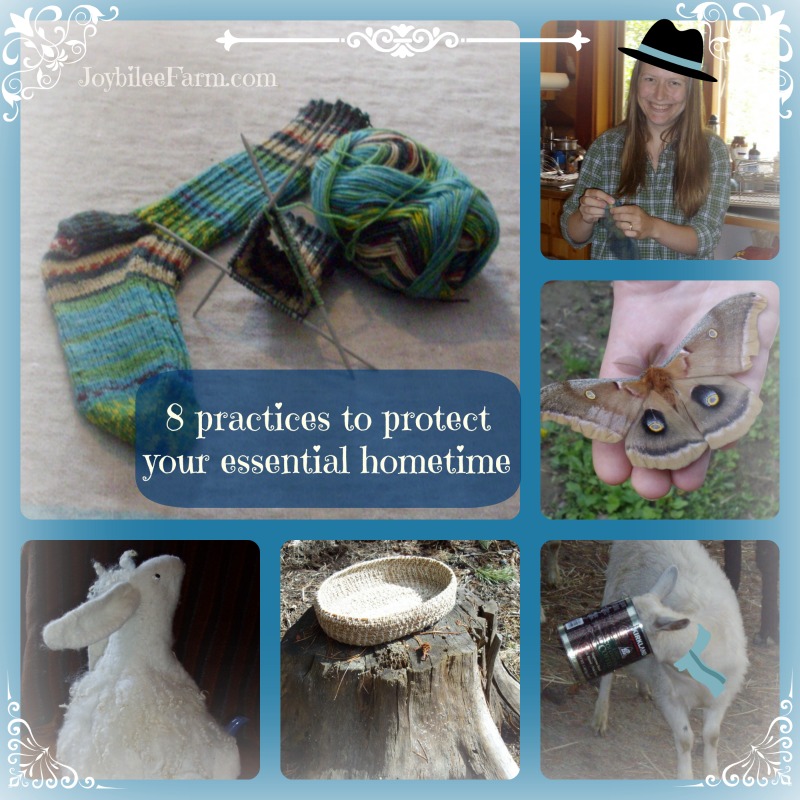Successful homesteaders are home — 8 practices to protect that essential home-time
Successful homesteaders are home. Here are 8 ways how to protect your time at home.

One of the problems of rural life is the compulsory trips into “town”. If you work from home, live on a rural homestead and meet your own needs sustainably, through the efforts of your own hands, you need to be home to do the work. But life in town compels you to leave your rural paradise and travel — at great costs in gas and time. You need to go to town to pick up your mail, serve on the volunteer committees you are a part of, show up for church or your clubs, service your consignment outlets, take the kids to lessons or sports, and maybe work a part-time job. A trip to town can easily take half a day. Add a few trips to town into your week and your time on the homestead is gone. Then you wonder why the barn doesn’t get cleaned out, the laundry piles up or the wonderful home-cooked meals you planned are substituted with packaged foods. Further, it’s very difficult to homeschool a family if you are not home. The key to successful homeschooling is HOME.
How can you protect your time at home?
1. Value your time at home.

You moved to your rural property to live a life of significance and nonconformity. You were dissatisfied with city life and the demands of the routine 9 to 5 job. You embraced a life of creativity, sustainability and you invested your money and time to make it a reality. Now you need to carve out your paradise and practice contentment.
When you live in the city, your home is the place you sleep, but most of life happens away from home — at work, at school, in the Mall, at church, online. When you move to the country, you also need to change how you think about home. If you keep doing life as you did in the city, you aren’t really homesteading, you’ve just traded one commute for a longer commute and bigger gas bills.
When my children were young, I bought into the lie that I was “trapped at home with toddlers.” Reading women’s magazines or listening to Dr. James Dobson on the radio, increased my feelings of isolation and fear. I felt lonely and driving over to friends for coffee seemed to assuage that loneliness, temporarily. But really my solution to the loneliness didn’t make me less lonely. It was a festering band-aid that created more loneliness and deepened my feelings of inadequacy.
Then I had an epiphany. I cancelled my subscriptions to women’s magazines and turned off the radio. I started looking squarely at my own nonconformity and realized that everyone feels lonely. Everyone feels like they don’t belong. Everyone feels like they don’t measure up — it’s a product of the industrial system that bases the worth of a person on what they DO. When I changed how I was thinking and embraced the season of educating my children through home education, I started to learn along with my children, and my creativity and sense of well-being blossomed. I looked at my children differently, too. They weren’t creatures that had to be cared for and took up my time — enslaving me with their needs, and preventing me from DOING something significant. Instead, they were blossoming human beings with unique gifts, talents and idiosyncrasies that I learned to nurture and cherish. Unfortunately for my eldest child, I was clumsy getting this process down pat. I wished that I had learned this lesson sooner.

2. Create tranquil spaces in your home that attract you and feed your inner man.
It’s hard to stay home when everywhere you look there’s more work to do. Start in your favourite room and declutter. Hang attractive pictures, add heat and light, cozy couch throws, some music and make it a retreat, a place you love to express your creativity or just relax. Having a home that fosters creativity and breathes beauty and comfort will make you happy to stay home.
3. Chose the times when you will go into town carefully.
Meetings are often timed for evenings when stores in town are closed. If you have a lot of meetings on your schedule, you are driving into town for a single-use. Avoid single-use trips, if possible. Try to manage your children’s music lessons, by getting groceries or serving on a committee. If you are the committee chairman, try to use the internet for meetings as much as possible. And if you do have to have a meeting — make sure that there is a call to action in the meeting. Never plan a meeting just for the sake of having a meeting.
Read This Before Our Next Meeting If you are in charge of planning meetings, read this book and change the way you do meetings.
Sometimes you need to go into town for a single meeting — church on Sunday morning, Wednesday night community choir, yet another AGM. At those times make the commitment with your family, so that at least you can combine family time with the errand. If that’s not possible re-evaluate your priorities.
4. Don’t let other people’s urgency become your priority.
So often the trips to town take place because someone outside your family decided that you needed to be somewhere: Your child is getting an award at a public event; there’s an emergency meeting of a committee that you’re on because someone resigned; there is a future meeting that couldn’t happen because it wasn’t a priority for someone else and suddenly it’s urgent so a meeting has been called. This is called the “tyranny of the urgent“. You need to ask yourself, “Is this important to me?” “Do I have a unique contribution to make, that no one else could make at this meeting?” “If I didn’t attend would my absence be detrimental to the outcome of the meeting?” Make your decision to show up based on your answers to these questions, not on someone else’s urgency. (And in case you were wondering, yes, I am going to the event where my daughter is receiving a reward on Thursday night. ☺)

5. Communicate with other family members and consolidate trips to town with lessons, errands and meetings.
Very often a family member will decide to “run into town to get the mail or go to the bank”, only to return home and find out that there was a parcel to mail or something needed from the store. It’s important to talk to everyone in the family. We had a clipboard by the door, for a while, and whenever something was needed from town or an errand was necessary, it was written down on the clipboard. That was an effective way to let everyone know that, “If you go to town, do this as well.” Find a system that works for you, so that trips to town can be effective.
6. Ask yourself if the meeting or trip truly requires your personal presence. Could the errand be delegated to another committee member who lives in town?
I am a member of two volunteer organizations. On average I have to attend two meetings a month. But during busy times I may have to go into town several times a month to execute my committee responsibilities. Sometimes the work I do could be done more economically by someone living in town. For instance, I designed the poster for the Boundary Artisan Christmas Faire, coming up in just 3 weeks. The poster needs to be printed and distributed to the participants. I travelled into town to deliver the digital file because the printer was unable to download the large file with their current internet bandwidth. Then I have to travel back into town to pick up the proof, make any corrections at home, and travel back into town to deliver it again to the printer. Finally, I will have to go into town to pick up the finished posters and deliver them to the art gallery where the participants will pick them up. Of these 4 trips to town, only 1 of them was necessary that I personally be involved — the initial dropping off of the digital file. The other 3 could be delegated to a town dweller if I had a willing partner in the community. Fostering community partnerships will help me save gas money and time.
Organizations that utilize volunteer labour don’t think of the expense or time costs that volunteers offer to the organizations. If this is the case with the organizations that you are a member of, talk to the board and get your voice heard. If you are the chairman of the board learn to delegate, and foster relationships that will make delegation easier.
7. When you do have to go into town, chose a time when other businesses are open so that you can manage more than one errand in the trip.
In our situation, Robin works a part-time job. We manage the job by going into town 2 afternoons a week as a family. While two family members do the job, the third runs errands in town so that our in-town time is limited to 3 hours one afternoon and 1 hour on the other day. Drop the kids at clubs and get the groceries. While the kids are at music lessons, network with other families. Carpool the kids, and share the responsibilities, so that you aren’t sitting in town waiting for the event to be over. And always have some knitting in hand, to get through the waiting periods. It’s amazing how calmer you feel while waiting if you are engrossed in your craft.

8. Set aside a few days each week where the whole family is working at home. On those days do not accept any in-town appointments, lessons or meetings. Protect that time as sacred.
In order to be successful in homeschooling, you need to be HOME. Kids need time to learn to read, do the math, play and do chores. Without the time investment, there is little real learning. In order to be a successful gardener or homesteader, you need to be in the dirt, or in the field. To be a successful fibre artist you need to sit at the spinning wheel or the loom. Invest the time to make your venture a success. Consider that you are working full time just as the professional in town. Your time is just as valuable, as theirs. Protect it.
You also need to protect your family time. Family night is very difficult to protect when each of your kids is out on a different night during the week. Youth group on Friday, college and career on Wednesday, homegroup on Tuesday, choir practice on Sunday, music lessons on Monday. Learn to pick and chose. We limited our kids to one lesson and one outside activity. With three kids that still had the potential to be 6 nights away from home out of 7. Consolidate, if possible. Place music lessons back to back. Have all your kids at the same teacher. Begin when your children are babies to make one 24 hour period each week as a sacred time. On this day you don’t go out, you don’t leave the property except as a family. And you focus on REST, family relationships and revitalizing your relationships. This day becomes a sanctuary in your weekly activities.
We tried to do this on Sundays for many years. But we found that when you attend church, you are forced to leave your home. Then other things muscle in on the day and before you know it — there was no rest, no revitalization and no sanctuary. Sunday became the busiest day of the week. Then we tried to set aside a Sabbath rest from sunset Friday to Saturday night. The first time it was wonderful. But in the following 8 weeks, Saturdays became busier than Sundays used to be. There are forces at work to prevent you from taking a day off to rest as a family.

You need to say, “No” and hold one day as a sacred day, a family time. If you don’t do it, no one will do it for you. This is the lesson I’m learning now.
Home is where the most important parts of your homestead lifestyle happen. You need to protect your time at home and nurture it to be successful. First, you need to change the way you think about your home — it’s more than just a place to sleep. Secondly, you need to re-evaluate the things that pull you away from home and ensure that they fit in with your personal and family priorities. If they don’t, make the changes that protect your time at home. Have the courage to live as a nonconformist, embracing your values and priorities, doing the things you love, where you want to live, and saying, “No” when necessary.
Your turn:
How do you manage the tyranny of the urgent in your family? What stories can you share about times you were successful? Times you weren’t so sure? Leave a comment.



Thank you for renewing all the reasons why I began this lifestyle in the first place, and for empowering me more to stand my ground not just with those outside my family, but with my family as well. I needed to read this.
Thank you for an inspiring article. I am an emptynester in suburbia. I have filled my days with commitments because I shouldn’t be alone now that the kids are out of the house. However, I can’t remember the last time I had a full day in my quilting room. My gardens have been looking shaby because I don’t put the time into them. ( I can’t get dirty in the yard if I’m about to go out somewhere). And I have not been joyful. Thank you for inspiring me to be “alone” in my house to be creative and joyful.
Glad to help. I hope you find your place soon. The transition to an empty nest can be hard till you find the right balance for you.
Enjoyed reading your articles, there is always something to learn in these subjects.
An excellent read and helpful to hear other family’s tips on how they have made rural living comfortable and healthy. Thank you for sharing!
Hi, Kris
Thanks for stopping by and leaving a comment. Nice to meet you.
Chris